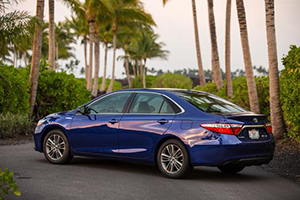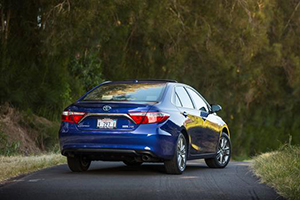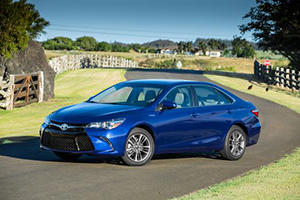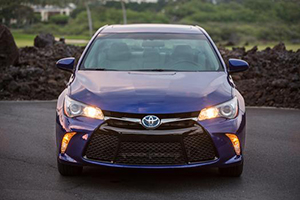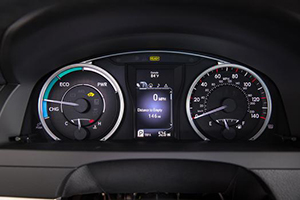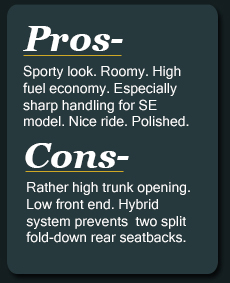2016 Toyota Camry Hybrid
The 2016 Toyota Camry
Hybrid is a fuel miser with comfort and flair.
Prices: $26,790-$30,140
The 2016 Toyota Camry allows sparkling fuel economy for a fairly large
mid-size sedan that looks good and is enjoyable to drive.
The front-drive Camry sedan never has been anyone's hot rod, but the
2015 model was made racier, with almost all-new rakish sheet metal. It
was a bit longer, with a slightly wider track and better road manners.
Nothing new here for 2016.
A price must be paid for more rakish, aerodynamic styling. The Camry's
new styling gave it a low front end that can be damaged by high curbs
and such. However, the front end is high enough to clear common
obstacles.
The interior of the 2015 Camry was nicely redone and made quieter, and
spring and shock absorber rates had different tuning for each
model--from basic to sportier.
The Camry long has been among the top-selling mid-size sedans, so
Toyota wasn't about to change the car much for 2016. It remains a
no-fuss, safe, reliable auto that doesn't cost much to run. Just turn
the key and go.
The regular 2016 Camry has a 2.5-liter four-cylinder gas engine with
178 horsepower or a 3.5-liter gas V-6 with 268 horsepower.
The 2016 Camry Hybrid has a sophisticated 2.5-liter four-cylinder gas
engine and a small high-torque electric motor. The system produces 200
horsepower. It varies power between the gas engine and electric
motor, or combines both, as needed. The system works seamlessly with a
continuously variable automatic transmission (CVT).
Depending on trim level, Camry Hybrid prices go from $26,790 to
$30,140. I tested the mid-range $27,995 SE model. (The Camry Hybrid is
available in LE, SE and XLE grades so hybrid drivers can have the same
luxury and sportiness available in the Camry gasoline model XLE and SE
grades
The Hybrid Synergy Drive powertrain allows a (conservatively rated, in
my opinion) 7.6 second 0-60 m.p.h. time and swift passing on highways.
The hybrid system has no black magic. Through its transaxle, Hybrid
Synergy Drive combines output from the four-cylinder engine and
electric motor. Regenerative braking converts the electric motor to a
generator that captures kinetic energy when the brake is applied,
storing it in the hybrid battery pack.
Hill-start assist control helps prevent the car from rolling backward
when starting off on an incline when the brake pedal is
released.
Toyota's media information says the Camry Hybrid's estimated fuel
economy is 43 miles per gallon in the city and 39 on highways, although
the price sticker on my test Camry Hybrid SE sedan put the figures
lower--at 40 city and 38 highway.
The easily read three-dimensional Optitron gauges had an indicator with
a needle that pointed to "CHG" mode for charging the system when
driving, "Eco" to optimize throttle response and air conditioning
output to help prioritize fuel economy, besides "PWR" when accelerating
hard.
Toyota says an "EV" mode lets the Camry Hybrid operate only on the
electric motor for up to 1.6 miles at below approximately 25 m.p.h.
A TFT screen's color animation displays a range of vehicle functions
and coordinates with a multimedia system to display audio, navigation,
warnings and communications. It's also networked with the direct Tire
Pressure Monitor System so you can see the pressure in each tire.
For sportier drivers, the Camry Hybrid SE might be the best choice
among the three Camry Hybrid models.
The SE is among the raciest-looking Camrys with such items as black
sport trim bezels, color-keyed rear spoiler, 17-inch alloy wheels with
a graphite finish and chrome-tipped exhaust. Discrete "Hybrid Energy
Drive" emblems are on the front fenders and trunk.
The Camry Hybrid SE has premium soft-touch materials, attractive
stitching on the seats and dashboard and many comfort, convenience and
safety items.
For instance, there's an 8-way supportive power driver's seat,
dual-zone automatic climate control, 12-volt power outlets, Entune
audio with a 6.1-inch touchscreen, backup camera, push-button start and
a TFT multi-information display. and a fold-down rear seatback with a
pass-through.
However, instead of the 60/40 split rear seatbacks found in many cars,
only one of the Camry Hybrid's rear seatbacks folds forward (with a
pass-through area) on the rear passenger side because of space taken by
the Hybrid system.
Still, the trunk is roomy, although it has a rather high opening. And
there's no trunk lid interior pull-down feature such as a strap or
handle to help close it more easily.
All doors open wide and contain generous storage pockets.
There's also a deep covered console bin. All cupholders are easily
reached.The heated power outside mirrors automatically fold toward the
side door glass when the car is turned off to prevent parking lot
damage.
There's plenty of room for tall adults, although the center of the rear
seat is firm
A power tilt/slide moonroof is a $915 option.
The thick leather-trimmed steering wheel allows a confident grip.
The rather firm steering is quick, and the regenerative braking
feature doesn't cause unusual brake pedal feel.
My test car's handling was quite good because the SE has specific
suspension tuning with a unique stabilizer bar, absorber valve
structure and control arm bushing components. There's also a
vehicle stability control system that has been retuned for smoother
intervention and a more natural driving feel.
The ride is supple, with the suspension easily soaking up bumps.
Traction controls is also standard, as are anti-lock brakes with a
Smart-Stop technology brake-override system.
Contributing to safety are ten air bags.
The hood glides up smoothly on twin struts, and all fluid filler areas
can be easily reached, particularly the one for the engine oil.
The fuel gauge needle on my test Camry Hybrid remained on the "full"
mark despite a fair amount of freeway and suburban street driving done
at normal speeds.
That, alone, helped give the Camry Hybrid special appeal.

